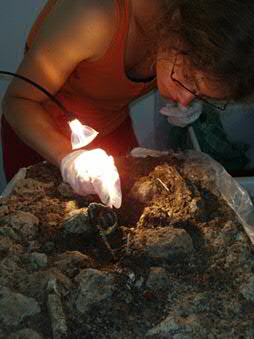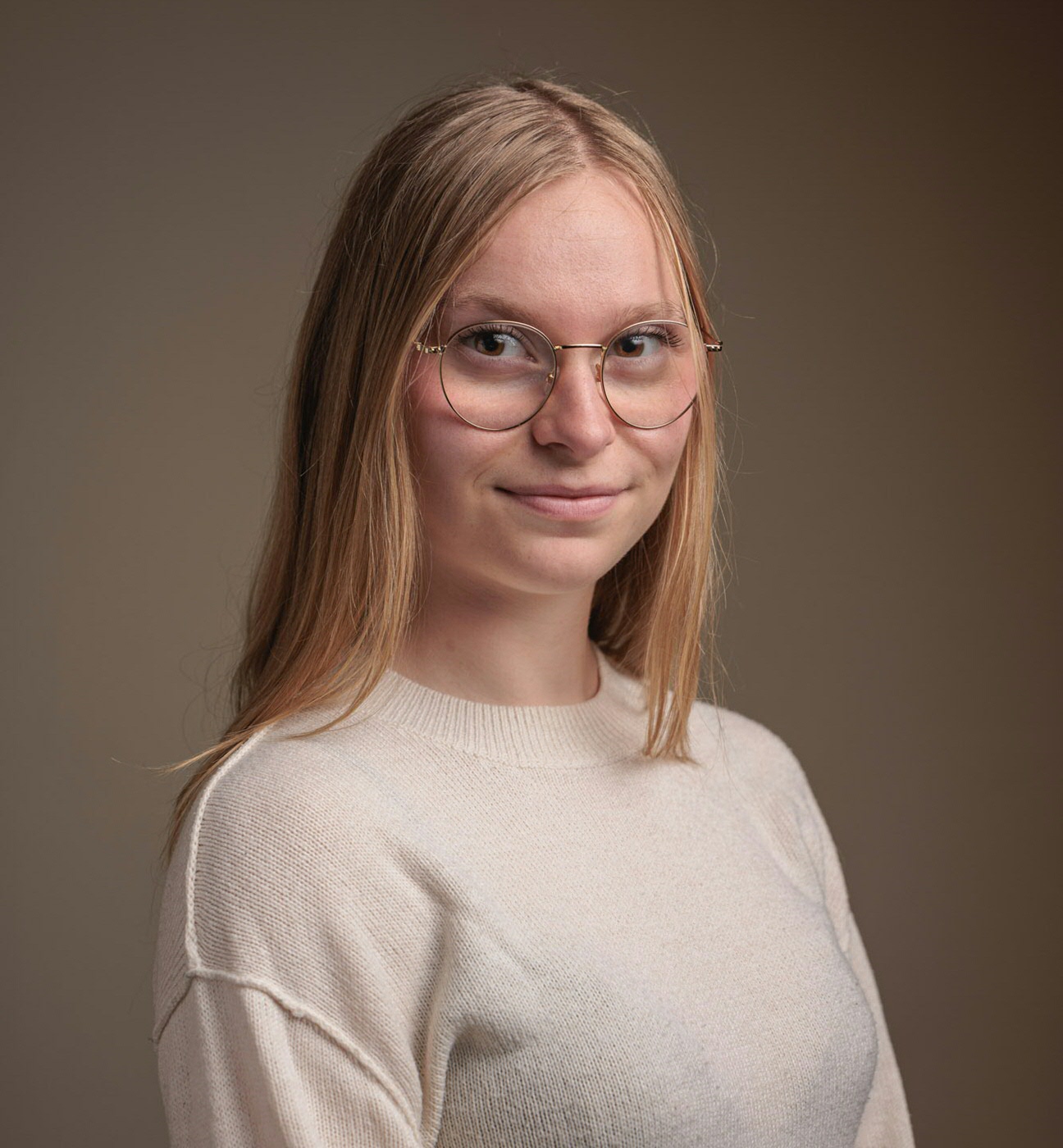
Welcome to our versatile Archaeology programme, judged best in the Netherlands for the last 10 years, which will help you become a top-level archaeologist. All pre-university profiles are accepted!
The Bachelor's degree programme in Archaeology at the University of Groningen, taught mainly in Dutch, allows you to study cultures from the Palaeolithic to the Middle Ages, and the Mediterranean all the way up to the Arctic region.
In the first year you follow introductory courses, amongst others on Mediterranean archaeology, the archaeology of the Netherlands and about various kinds of material remains from the past (ceramics, bones, pollen and seeds, et cetera). In the second year you choose, within two thematic modules, a workgroup focused on either Classical and Mediterranean or Northwest-European archaeology. You also follow a series of practicals to acquaint yourself with various bio materials (seeds and pollen, animal and human bone remains). You will participate in an excavation in the Netherlands or abroad and you will familiarize yourself with geo-archaeological approaches. In your third year, you will follow a Minor at the UG or other university in the Netherlands or abroad and complete your Bachelor's degree programme by writing a thesis.
With your Bachelor's degree in hand, you an continue on to
the one-year Master's programme in Archaeology. Students who
perform exceptionally and who enjoy doing research can enter the
two-year Research Master's programme in
Archaeology.
- For
international students only: Apply before 28 February and
receive a decision on your admission within one month. See www.rug.nl/earlybird for
more information.
In your first year you will follow course units in the following fields: • an introduction to concepts, approaches and methods in archaeology • an introduction to the prehistoric and early historical archaeology of the Netherlands and the archaeology of Greece and Italy • theory and history of archaeology: how to draw conclusions based on archaeological observations • introductions to material studies and bioarchaeology • an interdisciplinary class on classical heritage • excavation te
| Semesters | ||||
|---|---|---|---|---|
| CoursesCourse Catalog > | 1a | 1b | 2a | 2b |
| Archeologie: een introductie (5 EC) | ||||
| Archeologie van de Griekse en Romeinse wereld (10 EC) | ||||
| Archeologie van Noordwest-Europa (10 EC) | ||||
| Archeologie en Antropologie: Geschiedenis en Theorie (5 EC) | ||||
| Bioarcheologie: een Introductie (5 EC) | ||||
| Materiaalkennis, Conservering en Archeometrie (5 EC) | ||||
| Facultair vak: The Classical Past and Heritage Formation (10 EC) | ||||
| Archeologisch Veldwerk 1 (10 EC) | ||||
In the second year you follow an introduction to Arctic archaeology, you learn how to work with spatial analysis software (GIS) and you follow to in-depth thematic courses in which you choose a working group that fits your regional interest (north-west Europe or the Mediterranean). In the second semester you follow modules on bioarchaeology (zoology, botany and human osteo-archaeology). You will also participate in a field's project and learn about geo-archaeological approaches and methods.
| Semesters | ||||
|---|---|---|---|---|
| CoursesCourse Catalog > | 1a | 1b | 2a | 2b |
| Arctic Cultures, Past and Present (5 EC) | ||||
| Artefacten in Actie: De Archeologie van Materiële Cultuur (10 EC) | ||||
| De Archeologie van Sociale Complexiteit en Verandering (10 EC) | ||||
| GIS en Archeologie (5 EC) | ||||
| Archeobotanie (5 EC) | ||||
| Archeozoölogie (5 EC) | ||||
| Human Osteoarchaeology (5 EC) | ||||
| Geoarcheologie en Archeologisch Veldwerk 2 (10 EC) | ||||
| Integrating Bioarchaeology (5 EC) | ||||
In the first semester of year three you follow a minor outside archaeology or you go abroad. In the second semester you follow an interdisciplinary faculty course of your own choosing. Furthermore, in preparation for your bachelor thesis, you will furthermore train your research design skills and you will practice with various methods to analyze digital data.
| Semesters | ||||
|---|---|---|---|---|
| CoursesCourse Catalog > | 1a | 1b | 2a | 2b |
| Minor (30 EC) | ||||
| Archeologie voor een Veranderende Wereld: Theorie in Praktijk (5 EC) | ||||
| Onderzoeksontwerp en Data-analyse (5 EC) | ||||
| Facultair vak (10 EC) | ||||
| Bachelorscriptie Archeologie (10 EC) | ||||
Please note that above is the programme for the current academic year (2025-2026). From 2026-2027, the courses of this programme will change. More will be announced in Spring 2026.
| Programme options |
|---|
| Minors (minor) A Minor is a coherent set of courses that support you in your next career step: the choice of a specific Master's degree programme or access to the labour market. Besides that the Faculty minor gives you the opportunity to look beyond your field of study. A Minor comprises 30 ECTS. |
| University of Groningen Honours College (honours program) The Honours College will give talented, motivated students the chance to be challenged even more by following Honours programmes and taking part in numerous other activities. The Honours College comprises a broadening part and a deepening part and has a study load of 30 ECTS credit points besides the 180 ECTS credit points from your regular Bachelor programme. |
There will be an opportunity in the first semester of the third year to spend time at a foreign university. We currently have partnerships with a number of universities, including Leicester (UK), Aarhus (Denmark), Ghent (Belgium), Venice, and Rome (Italy). If you would like to study abroad, please contact to the coordinator, Lidewijde de Jong (lidewijde.de.jong rug.nl).
Met het VWO examen Engels voldoe je aan de taaleis.
Met het VWO examen Engels voldoe je aan de taaleis.
Met het VWO examen Engels voldoe je aan de taaleis.
Met het VWO examen Engels voldoe je aan de taaleis.
Taaleis Engels: een VWO diploma, deelcertificaat voor VWO Engels (cijfer 6 of hoger), minimum TOEFL eis iBT 90 (met een minimum van 21 voor alle onderdelen), of IELTS 6.5 (met een minimum van 6 voor alle onderdelen) of Cambridge C1 Advanced of C2 Proficiency met een minimum score van 180. Klik op de link voor meer informatie: https://www.rug.nl/let/studeren-bij-ons/bachelor/aanmelding-en-inschrijving/language-requirements-ba
The degree programme will organize a matching procedure. Attendance is optional. The advice is not binding.
De Faculteit der Letteren gaat er van uit dat jij, via een bezoek aan de Open dagen, deelname aan een Eén Dag student en/of aan een Webklas, jezelf goed hebt voorbereid op de opleiding van jouw keuze. Op basis van deze voorlichtingsactiviteiten bepaal jijzelf of je goed matcht met de opleiding.
Vragen over matching bij de Faculteit der Letteren? Hier kun je verdere informatie vinden: www.rug.nl/matching
| Type of student | Deadline | Start course |
|---|---|---|
| Dutch students | 01 May 2026 | 01 September 2026 |
| 01 May 2027 | 01 September 2027 | |
| EU/EEA students | 01 May 2026 | 01 September 2026 |
| 01 May 2027 | 01 September 2027 | |
| non-EU/EEA students | 01 May 2026 | 01 September 2026 |
| 01 May 2027 | 01 September 2027 |
The Faculty of Arts believes students can decide for themselves whether they match with their chosen program based on the available bachelor program information, by visiting the Open Days, and by participating in a Webclass and/ or Student for a Day. If you are unable to attend one of these activities, a final opportunity for matching is to contact one of the students of the program in June.
If you have any further questions about matching, check out: www.rug.nl/matching
| Specific requirements | More information |
|---|---|
| previous education |
Requirements for International diploma holders: see Admissions Guide. It contains the criteria for all International VWO equivalents: https://www.rug.nl/vwo-equivalent-qualifications |
| language test |
International students will have to satisfy an additional Dutch language requirement, which can be met by passing the State Examination in Dutch as a Second Language (NT2, programme II). This examination guarantees Dutch proficiency at CEFR level B2. However, Dutch proficiency at CEFR level C1 or higher is recommended. |
| Type of student | Deadline | Start course |
|---|---|---|
| Dutch students | 01 May 2026 | 01 September 2026 |
| 01 May 2027 | 01 September 2027 | |
| EU/EEA students | 01 May 2026 | 01 September 2026 |
| 01 May 2027 | 01 September 2027 | |
| non-EU/EEA students | 01 May 2026 | 01 September 2026 |
| 01 May 2027 | 01 September 2027 |
If you want to continue with a Master's degree programme after your graduation, as most students do, you will have a wide range of programmes to choose from. With a Bachelor's degree in Archaeology, you have access to the following Master's tracks at the University of Groningen:
Over the past years, almost all our BA students have chosen to also follow our MA programme. With your BA degree you can work as a junior archaeologist in commercial archaeology. It is important to know that developing a career in commercial archaeology is only possible with an MA degree in archaeology.

Teaching and research are closely linked to one another in Archaeology. You will conduct research right from the start of the degree programme.
Archaeology research falls under the renowned Groningen Institute of Archaeology and focuses on:
The Institute has its own modern laboratory facilities, as well as a ‘bone attic’.

Are you a pre-university pupil and would you like to find out what studying at university is all about? The Archaeology degree programme offers a web class! A web class is a course offered by the UG via Brightspace (a digital teaching environment) for pupils in the 5th and 6th years of pre-university education. The course involves ten study hours, which serve as an introduction to Archaeology. You read texts, do assignments and hold discussions with other prospective students and a lecturer.
Interested? Sign up for the web class.
Are you curious about the Archaeology programme and would you like to know more about the fieldwork carried out by Bachelor's students? In this video you tag along with students that are digging around a convent in Ter Apel.
The Archaeology programme also has a bone attic. Here you will find the bone collection of the archaeologists of the UG. Based on these bones they learn about the cohabitation of humans and animals in the past. In this video, the collection manager gives a tour of the bone attic.